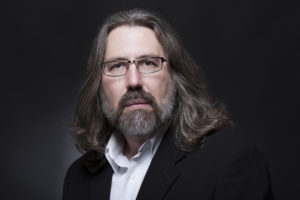 Column: “Meaningful-Faith: Words, the Word, and a Life of Substance”
Column: “Meaningful-Faith: Words, the Word, and a Life of Substance”
By Mark Williams, Ph.D.
Professor of Rhetoric, California State University, Sacramento
Boo.
October 31, 2021
I am in the middle of preparing an update to a textbook on public speaking, and that means the publisher has tasked me with locating a set of images or illustrations for the text from the stock of licensed illustrations held by one of their business partners. Basically, I go into their partner’s gallery of a zillion stock images and search up terms like “emotion” or “podium” and I am provided with some 8,000 of the least engaging, most predictable, dullest illustrations of podiums or emotions that have ever presented themselves to the human imagination.
The textbook I am working on includes some discussion on the challenges of religious discourse, and a few weeks ago that led me to plug in the word supernatural.
I am just going to assume that what came up has something to do with the fact that Halloween is close.
These stock images fell into four basic categories. There were pictures of dark-hued vaguely human-like things. They were surrounded by smoke or mist and usually had tattered wings, horns, and eyelids of violet flame, sometimes with clownish faces, often with bloody fangs. Alternatively, there were Kelly-Brook-shaped fairies, generally in teddies or pasties, dancing around flowers, though to be fair there were a few completely topless Henry-Cavill-shaped fairies mingled in. Third, there were exceptionally, extremely, very, extraordinarily fluffy clouds, frequently backlit in pastels and occasionally with one or two beams of light breaking through them. Last, there were patently cliched, uninspirational, innocuous “Coexist” type images—picture an image of a Jewish Rabbi and a Muslim Imam standing with their arms around each other’s shoulders; the world is now better. Supernatural.
How far the mighty have fallen.
Just to be clear, the term supernatural is Latin: natura is the set of all matter and change and movement and time and space. It is the sum total of all measurable reality: the world, the universe. The Latin word super means “above, over, beyond.” When you take everything that is matter, energy, time, space, and then you draw a big (like, really big) chalk circle around all of it, the supernatural is what lies outside the chalk circle. There, in Christian theology, is God’s home, his native element: the unimaginable and indescribable timeless spaceless presence of the divine Being, causing Himself to be the One who causes Himself to be the One causing Himself to be. Super natural. If we wish to take the word seriously, we will very quickly find that it is not a place for the faint of heart, I suspect.
Both the beast-things and sexy fairies are, at one level, just different points on the spectrum of silly eye-roll candy. I am, in the end, a good bit more interested in those other two categories: the hypercumulus clouds and the coexisting clergy. Clergy should, certainly, cooperate and coexist, and I am not being sarcastic. Also, clouds are nice. But I see both of those sets of images—clouds and clergy—are objects of disappointment more than eye-roll mockery. Both, it seems to me, miss a crucial element of the supernatural: its relentless, infinite threat. Its casual terror.
In some ways, then, the fanged and bloodied beasts get at least as close to the word supernatural as the clouds and convivial clergy, and probably much, much closer. As we frequently note in our memes, “Calm down!” is always the first thing an angel says. But fluffy clouds and polite pastors do not generate the type of emotions that require that sort of angelic command. Fanged beasts do.
And those clouds and clergy images have not been loaded into these search engines on a manager’s whim or a low-level employee’s best guess. They are put there, usually, after some leg work and professional surveying. Evidently, clouds and clergy are among the things that first come up when the word supernatural is tossed at a generic focus group. But we have to ask ourselves whether our own sense of the word is much different. Are those of us who claim to believe in the incarnation so very counter-cultural on this term?
Perhaps our own idea of supernatural reality is so full of inattentive chumminess, informal chatter, and sentimental self-therapy that we have forgotten just how much of a threat to our idolized autonomy and indulgent, self-constructed identity is waiting for us on the other side of that chalk circle.
Maybe, this Halloween, we could spend a few minutes retooling the meaning of that word supernatural, and relearn some of our old forgotten fears.
